14. Pleasantville (1998)
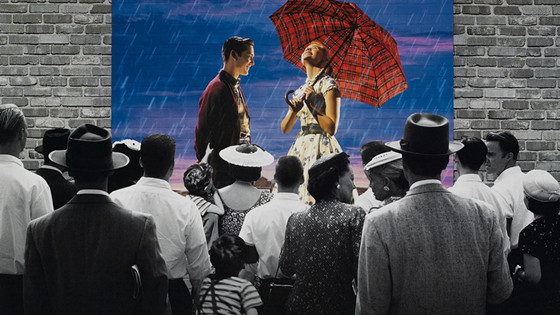
Television has always had an impact on society. It informs us, it entertains us but it also conforms us. News coverage, advertising and even entertainment has fed the public a narrative, one that encourages conforming, procreation and consumerism. Up and until recently, many shows also promoted wholesome, conservative values. Shows like The Brady Bunch encouraged family values where Dad works, Mum stays home and the various children all excel in school and sports, hardly ever stepping out of line.
It is this wholesome image that draws in David (Tobey Maguire) an introverted teenager who clearly wishes to escape his mundane life with a shallow sister, Jennifer (Reese Witherspoon), and a single mother struggling to find love in her life.
Both David and Jennifer are sucked into the black and white world of Pleasantville. Assuming the roles of Bud and Mary Sue, children of George (William H. Macy) and Betty (Joan Allen) Parker, they both keep their identities a secret and David warns against changing anything.
In Pleasantville, it never rains, the temperature never rises or lowers, the fire brigade exists only to rescue the same cat from the same tree everyday and the basketball team never misses a hoop. It is an eerily creepy place. However, it is not long before the 90’s and 50’s clash head on as David and Jennifer’s influence slowly ‘corrupts’ the town. Burger joint owner Bill (Jeff Daniels) discovers a love of art while Betty embraces her sexuality.
As more and more citizens break their social conditioning, they change from black and white into colour. The film is a little on the nose, especially when the conservative town fathers, still black and white, instigate books burnings, riots and harassment of ‘colours’ in the street. The film takes aim at the utopian perception of 1950’s America and portrays its dystopian attributes.
13. Nightcrawler (2014)

As Louis Bloom, Jake Gyllenhaal delivers one of his most powerful and creepy performances. As a night owl (insomnia is hinted but never addressed), Bloom spends his nights roaming Los Angeles, eager to make a quick buck. This is post-GFC America. Bloom steals materials from construction sites and sells it back to other builders, all desperate for cheaper materials. However, even they draw a line with Bloom, “I don’t hire thieves” one tells Bloom when he enquires about fulltime work.
Inspired by the work of LA’s crime photojournalists, Bloom buys himself a cheap camera and police scanner hoping to enter the world of crime journalism. The term ‘journalist’ is quite generous in this case. These men arrive at the scenes of car accidents, home invasions, robberies and murders, before selling the footage to local stations, desperate for ratings. If it bleeds, it leads is not just a mantra, it is a core philosophy. These men are not journalists. They are parasites.
Bloom is a character that is impossible to like. Apart from his creepy and almost detached behaviour, this is a man who takes advantage of his partner, manipulates crime scenes and even extorts degrading sexual favours from his producer Nina (Rene Russo).
What is worse is that Bloom (spoilers) gets away with it. He escapes justice and even expands his business, hiring a team of ‘interns’ (another slight jab at the free workforce that LA frequently takes advantage of) and promising them that he would never ask them to do something he would never do. An ominous promise from a man like Bloom.
12. The Deer Hunter (1978)
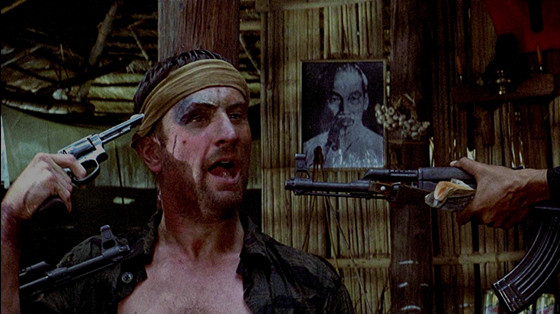
For many, the American Dream is not always about fame and fortune. For them, community is the foundation of their happiness. This is especially true in the small town of Clairton, West Pennsylvania, home to a large Russian-American community, including Michael (Robert De Niro), Steven (John Savage), Nick (Christopher Walken).
After finishing work at the local steel mill (the centre of the town and their world), the trio prepare for two rites of passages in their new homeland: marriage and military service. Steven is getting married and the group is planning on enlisting in the US Army to serve in Vietnam. Before they leave, however, they complete one of America’s greatest rituals: hunting.
Vietnam has affected the psyche of the entire town. Not just the veterans but also those left behind. Michael drives straight past his home, avoiding the welcome home party planned for him while Steven is left in a VA hospital, having lost both his legs falling out of a helicopter. His wife has yet to visit him, coping by sending him knitted pairs of socks in the mail.
This is a wounded community, emphasised in the final scene when the survivors unite in their local bar, morning the death of Nick and singing ‘God Bless America’. Is it patriotism? Not really. It is first aid. Not to the body but to the spirit.
Many of Clairton’s citizens are either immigrants or the children of immigrants, hailing from Ireland, Germany, Italy, Poland, Ukraine and Russia. They came believing that if they worked hard, America would provide for them. The Vietnam War was a devastating blow to the United States, a sense of loss and betrayal rippled throughout society, one that took years to recover. The Deer Hunter laments over this spiritual beating, one that can only be treated with a sense of community.
11. American Psycho (2000)
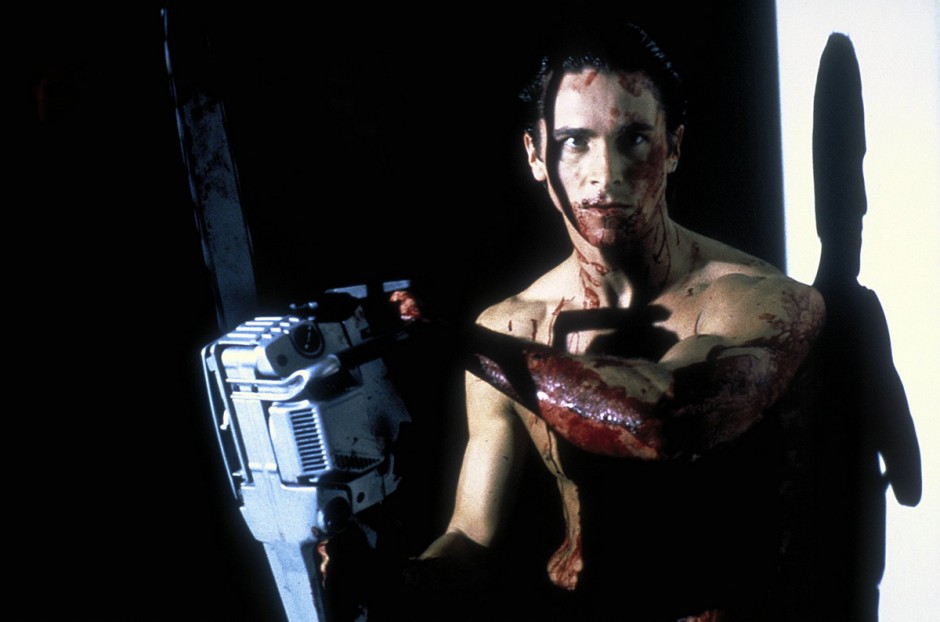
Wall Street has always been a popular metaphor for America, demonstrating the greed and ruthless nature inherent in the US model. American Psycho however, is a different kind of animal. Patrick Bateman’s problem is not that he is too greedy, it is that he is a delusional psychopath. Or is he?
From the very beginning, we are given a Patrick Bateman who is shallow, materialistic and narcissistic. Obsessed with maintaining the perfect physique and a youthful complexion, Bateman cares only about the image he presents to those around him. On the outside, successful investment banker with a beautiful fiancé and an active social life.
On the inside, a serial killer who dabbles in murder, rape, torture, necrophilia and cannibalism. However, author Bret Easton Ellis and director Mary Harron never fully reveal whether Bateman’s actions are real or simply psychotic delusions.
Bateman represents consumerist America. His entire life is dedicated to the yuppie lifestyle. Nothing is sacred to Bateman and his ilk, life is simply a transaction. Great wealth is earnt creating absolutely nothing and it is spent on property, fashion, culture and an excessive lifestyle.
Bateman is empty on the inside, hence why it is so easy for him imagine the things he does. Being shown up in a board meeting over business cards is so horrid to Bateman that he is willing to murder a friend and co-worker with an axe (or imagine it). Bateman is American consumerism personified.
10. Glengarry Glen Ross (1992)
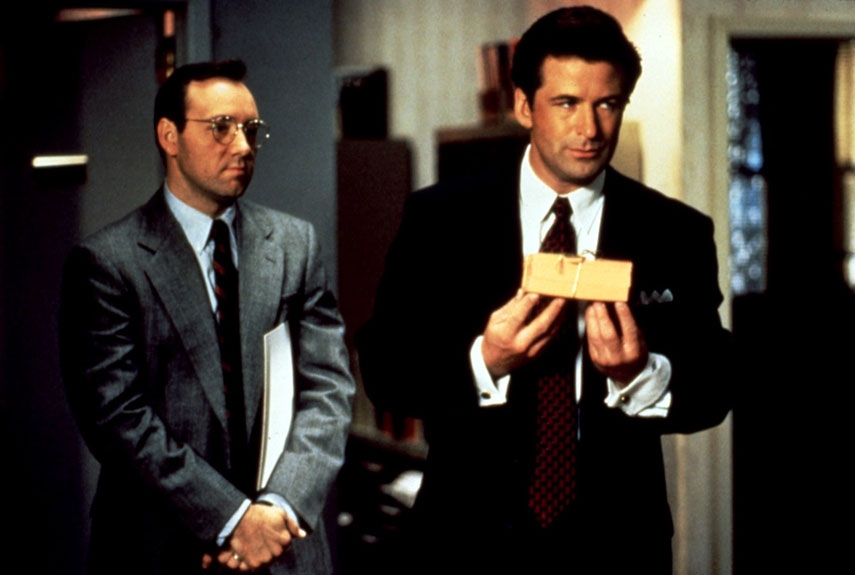
Glengarry Glen Ross is not the first time that the world of theatre used salesmen as a symbol of the American Dream. Arthur Miller did it first in 1949 with Death of a Salesman, with the gradual decline of salesman Willy Loman.
For David Mamet, however, the salesman were in fact a symbol of everything that is wrong with America. His characters are not honourable family men seeking happiness; they are manipulative, throat cutting con men seeking everything. Director James Foley allows the ‘Mamet speak’ to take centre stage and the cast, including legends Jack Lemmon, Al Pacino, Kevin Spacey, Ed Harris, Alan Arkin and Alec Baldwin, all seem to be having fun with the dialogue.
After a break in at a real estate office, several leads for prime real estate located at Glengarry have been stolen. An inside job is suspected. What could have driven one of these men to commit this crime? Was it Ricky Roma’s desire to win? Moss’ animosity towards his boss? Aaronow’s complicity? Or did the once great ‘Machine’ Levene finally snap under pressure?
These are horrible people. The bosses, represented by Blake, encourage a cutthroat environment, vowing to fire the person who comes last. Roma is not above emotionally manipulating a client, tapping into his insecurity and masculinity.
As for Levene, the source of his pity quickly comes under scrutiny. Once he is no longer able to use his sick daughter as leverage, he quickly resorts to blackmail and bribery. Was this a desperate last measure act, or this the ‘Machine’ Levene that everyone talks about? Ruthless and heartless. This comes as no surprise to anyone. It is a dog eats dog country, and those in charge encourage it.
9. They Shoot Horses, Don’t They? (1969)
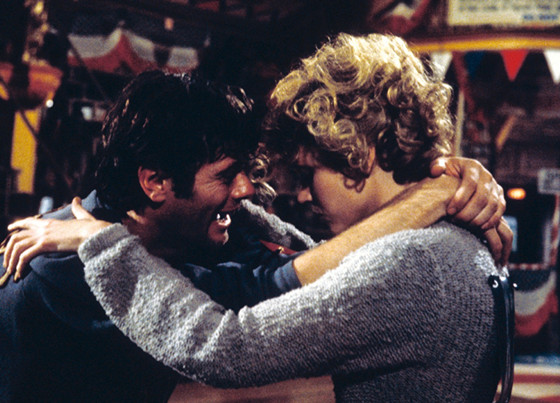
The Great Depression was a dark time, not just for the United States, but most of the developed world. It was, however, a time of great opportunity. After all, so many people were desperate. When else could a so-called entrepreneur encourage a group of people to take part in a dance marathon that is, for all intents and purposes, to the death?
Aspiring filmmaker Robert Syverton (Michael Sarrazin) wanders into the marathon led by corrupt MC Rocky (Gig Young) and is encouraged to join as the new dance partner for Gloria (Jane Fonda). As the tournament progresses, things go from excessive to downright cruel. Nothing is off limits as Rocky pushes the contestants from physical and psychological exhaustion to death.
However, nothing is as brutal as the film’s ending when Gloria, left depressed and meaningless, declares she intends to commit suicide. Unable to pull the trigger, Michael complies and kills her. Asked for his motive: “They shoot horses, don’t they?” A haunting glimpse at how cheap life can be, even in the United States. In the end, the only winner is MC Rocky, the symbol of corruption in the American Dream.
8. Born on the Fourth of July (1989)
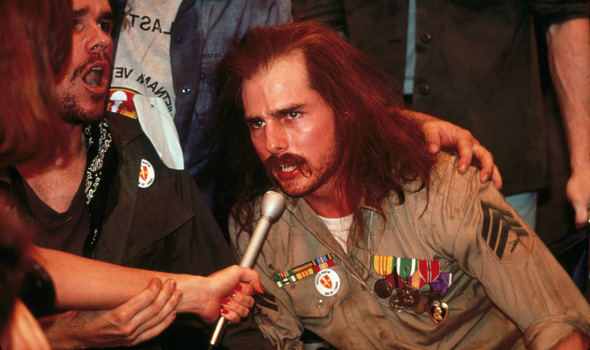
The Vietnam War has been a key source for material for director Oliver Stone. After all, Stone served in the US Army during the war, deployed between 1967 and 1968. While both Platoon and Heaven & Earth were a glimpse at the war from the perspective of US troops and Vietnamese civilians respectively, Born on the Fourth of July examines a lesser known casualty of the Vietnam War: the American spirit.
Ron Kovic (Tom Cruise) was a symbol of what made America great. Raised in a deeply religious and patriotic household, Ron was an All American teenager: active in sports, popular in school and a true patriot. Hell, he was even born on the fourth of July. Inspired by President Kennedy, he volunteers for the US Marines, serving with the elite 1st Reconnaissance Battalion. Following a friendly fire incident and paralysis, Kovic returns home, eventually becoming an anti-war activist.
Kovic’s naivety and innocence prior to enlistment makes his experiences during the war all the more devastating. After accidently shooting a fellow Marine, Kovic confesses but the indifferent response from his commanding officer leaves him in a worse state.
However, it is his time in a Veterans hospital, where the underpaid staff can do little to help, sometimes leaving patients in their own filth for hours at a time that truly awakens something inside of him. Audiences will cringe as Kovic, in an alcoholic and depressed state, screams at his mother about his manhood no longer working.
Stone clearly relates to Kovic, both having been left physically, mentally and spiritually damaged by the war. To both of them, as children of the ‘greatest generation’, serving your country was the greatest honour one could commit to. Instead, it left them bitter, angry and, worst of all, suspicious of their own country.